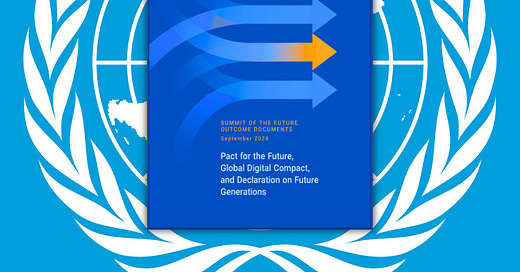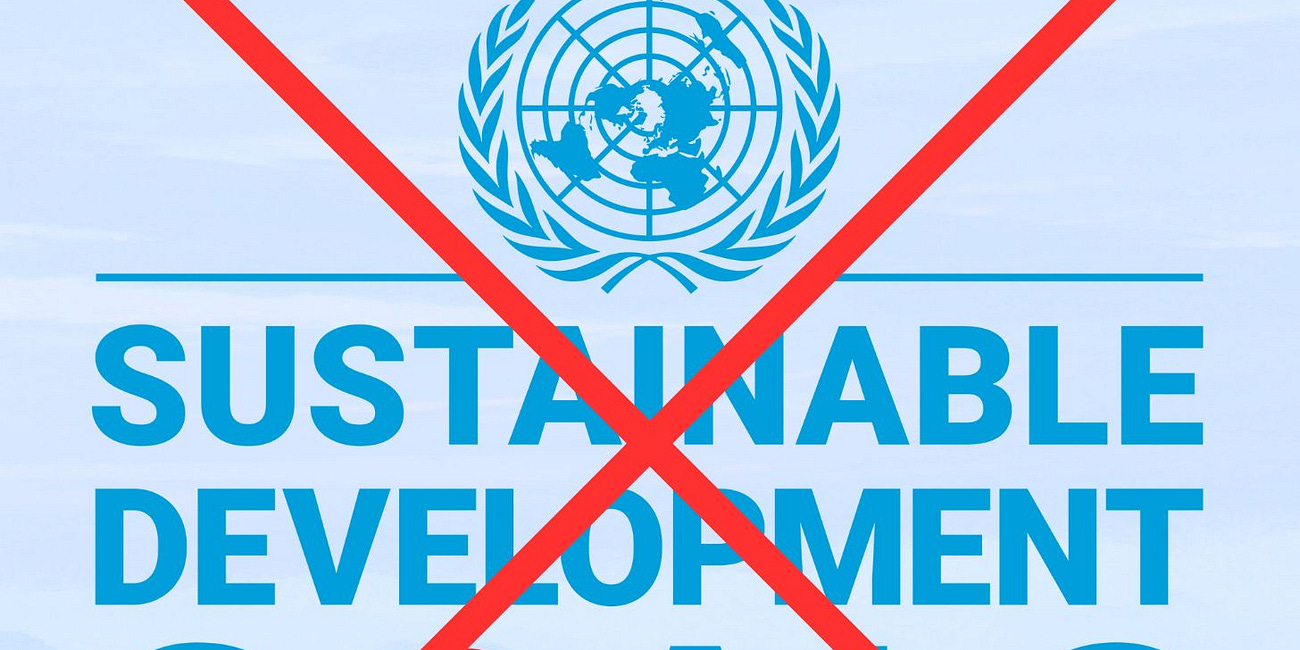U.N.'s Globalist 'Pact for the Future' Threatens U.S. Sovereignty
Demands compliance with "international law" and global mandates, as it insists on "a recommitment to international cooperation based on respect for international law."
The United Nations’ (UN) newly adopted “Pact for the Future” has raised alarms over the potential erosion of U.S. sovereignty.
Follow Jon Fleetwood: Instagram @realjonfleetwood / Twitter @JonMFleetwood / Facebook @realjonfleetwood
The pact was adopted at the Summit of the Future held last week.
From a freedom, liberty, and national sovereignty perspective, the United Nations is harshly criticized as an overreaching globalist entity that undermines individual nations’ autonomy, threatens personal freedoms, and imposes a one-world agenda at the expense of national interests and self-determination.
The comprehensive document calls for a unified global approach to tackling issues such as sustainable development, climate change, and international peace, which many critics argue could limit the ability of nations, including the United States, to govern independently.
The document highlights a series of binding international commitments that could impose global mandates on the U.S., challenging its legislative independence and prioritizing international law over national interests.
The new pact comes following the U.N.’s recent admission that its ‘2030 Agenda for Sustainable Development’ is falling short of expectations.
Subordination to International Law Threatens U.S. Sovereignty
A key concern in the Pact for the Future is its explicit emphasis on subordinating national law to international mandates.
The pact states, “We reaffirm our unwavering commitment to act in accordance with international law, including the Charter of the United Nations and its purposes and principles.”
This declaration implies that the U.S. would be compelled to align its policies with international law, even when it conflicts with its Constitution or domestic priorities.
This could undermine America’s ability to make independent legislative decisions, leaving the country bound by global mandates instead of sovereign rule.
Critics argue this is a direct attack on U.S. sovereignty, as it forces compliance with global norms over the country’s own laws and interests.
Moreover, the pact stresses the need for “a recommitment to international cooperation based on respect for international law, without which we can neither manage the risks nor seize the opportunities that we face.”
Critics suggest that this statement reinforces the idea that the U.S. may be pressured to prioritize international obligations over domestic policies, potentially diminishing the supremacy of its own Constitution.
Global Governance and Multilateral Systems
The pact calls for transforming global governance and reforming international institutions, including the UN Security Council, to make them more “democratic, equitable, and representative of today’s world.”
In doing so, it pledges to “reinvigorate the multilateral system to tackle the challenges and seize the opportunities of today and tomorrow.”
This shift in global governance could give international institutions greater control over decisions traditionally left to individual nations, posing a direct challenge to the U.S.’s ability to act independently on the global stage.
Climate Change Obligations
The Pact for the Future reinforces global commitments to the Paris Agreement and the United Nations Framework Convention on Climate Change.
It calls for “deep, rapid, and sustained reductions in greenhouse gas emissions in line with 1.5 degrees Celsius pathways.”
This push could obligate the U.S. to adopt stringent environmental policies that might conflict with national economic or industrial priorities.
By prioritizing global climate goals, the pact could force the U.S. into compliance with regulations that may not align with domestic interests.
Economic Commitments and Redistribution
The document further calls for closing the financing gap for Sustainable Development Goals (SDGs), particularly in developing countries, a move that could increase financial burdens on wealthier nations, including the U.S.
It also urges international cooperation on tax regulation, specifically proposing to “explore options for international cooperation on the taxation of high-net-worth individuals.”
Such measures could impact U.S. domestic fiscal policies, potentially leading to higher taxes or stricter economic regulations to meet global obligations.
These provisions may conflict with U.S. economic interests, especially if it means redistributing wealth on a global scale.
Commitment to Eradicating Poverty and Inequality
A significant portion of the pact is dedicated to addressing global poverty and inequality. The document emphasizes that “no one will be left behind,” calling for global mechanisms to eliminate poverty and inequality across nations.
This could lead to pressure on the U.S. to provide more foreign aid or comply with global redistribution schemes, even if such actions do not align with its national interests.
By prioritizing international redistribution efforts, the U.S. may find itself under obligation to fund initiatives that detract from its own domestic welfare and development programs.
Subordination to International Courts
Perhaps most concerning to sovereignty advocates is the pact’s language surrounding international legal enforcement.
It asserts that signatory nations must “fulfil (sic) our obligation to comply with the decisions and uphold the mandate of the International Court of Justice (ICJ) in any case to which our State is a party.”
This provision could compel the U.S. to abide by the rulings of an international court, even when such rulings contradict U.S. interests or constitutional law.
This would represent a significant shift of power from U.S. courts to international bodies.
Strengthening Global Governance
The document calls for the transformation of global governance, advocating for a stronger multilateral system that operates beyond the capacity of any single nation.
It insists on the need to “reinvigorate the multilateral system to tackle the challenges and seize the opportunities of today and tomorrow,” raising concerns that U.S. sovereignty will be compromised as it is forced to cede control over national policy decisions to global institutions.
Conclusion
The Pact for the Future presents itself as a blueprint for global cooperation on alleged challenges facing the world.
However, it comes at the potential cost of national sovereignty.
Through mandates on international law, climate action, economic contributions, and governance reforms, the U.S. could find its independence curtailed, with global institutions dictating policy direction.
Critics argue that the pact’s binding commitments, while aimed at fostering international collaboration, could prioritize global objectives over national interests, challenging America’s ability to govern itself independently.
It remains to be seen whether America’s role on the global stage will be one of compliance or resistance to retain its sovereignty in the face of a growing globalist agenda.
You can download the full U.N. document below:
Follow Jon Fleetwood: Instagram @realjonfleetwood / Twitter @JonMFleetwood / Facebook @realjonfleetwood
U.N. Admits Globalist 'Agenda 2030' Failing: 'Less Than 1/5 of Targets on Track'
In June of this year, the United Nations (UN) published a report admitting progress of its globalist ‘2030 Agenda for Sustainable Development’ plan “falls far short” of expectations.
Bill Blocking WHO, UN, and WEF from Imposing 'Rule, Regulation, Fee, Tax, Policy, or Mandate of Any Kind' Passes Louisiana Senate
In a landmark move on Tuesday for State sovereignty and local governance, the Louisiana Senate passed Senate Bill No. 133, a piece of legislation aimed at significantly limiting the influence and jurisdiction of certain international organizations within the state.
WEF-Aligned United Nations at Center of International Efforts to Block the Sun with Chemicals Sprayed Into Sky
Switzerland has submitted a proposal to create the first United Nations (UN) “expert group” to examine the use of controversial ‘solar radiation management’ (SRM), which involves blocking sunlight from reaching Earth.
'Past 485 Million Years' of Climate Data Confirm Earth Coolest It's Ever Been: Journal 'Science,' Washington Post
A brand new study published Thursday in the journal Science confirms that we live in the coolest time it’s ever been on Earth over the last “485 million years.”
Sun Drives Earth's Climate, Not CO2: 30-Page Study in Journal 'Geomatics' Refutes Mainstream Climate Change Narrative
A groundbreaking new study published Tuesday in the peer-reviewed journal Geomatics challenges the prevailing narrative surrounding the causes of so-called “climate change.”
'Climate Researchers' Want to Block the Sun by Injecting Aerosols Into the Sky: MIT Review
A February publication in MIT Technology Review explains that researchers have been working on injecting particles into the stratosphere to reflect sunlight for a long time.
Human CO2 Emissions 'Hardly Discernible in Observational Data,' Play 'Minor Role' in Climatic Evolution: Journal 'Sci'
A study published earlier this year in Sci, an international, peer-reviewed, open-access journal published quarterly online by MDPI, confirms humans have made no discernable impact on the long-term isotopic signature of carbon in the atmosphere.
Gates-Funded Technology Sprays Concoction from Aircraft Carrier Into Sky to Block the Sun in California: 'Extraordinarily Dangerous' Solar Radiation Modification (SRM)
In Alameda, California, a team of scientists from the University of Washington is testing so-called marine cloud brightening, a controversial geoengineering technique purportedly to cool Earth in the name of “climate change.”
Tennessee 'Chemtrail' Ban Goes Into Effect
As of today, Tennessee’s groundbreaking legislation prohibiting geoengineering experiments, particularly the release of chemicals into the atmosphere from airplanes, is officially in effect.















WHOA. Soooooo... was this The Covenant Of The Many??